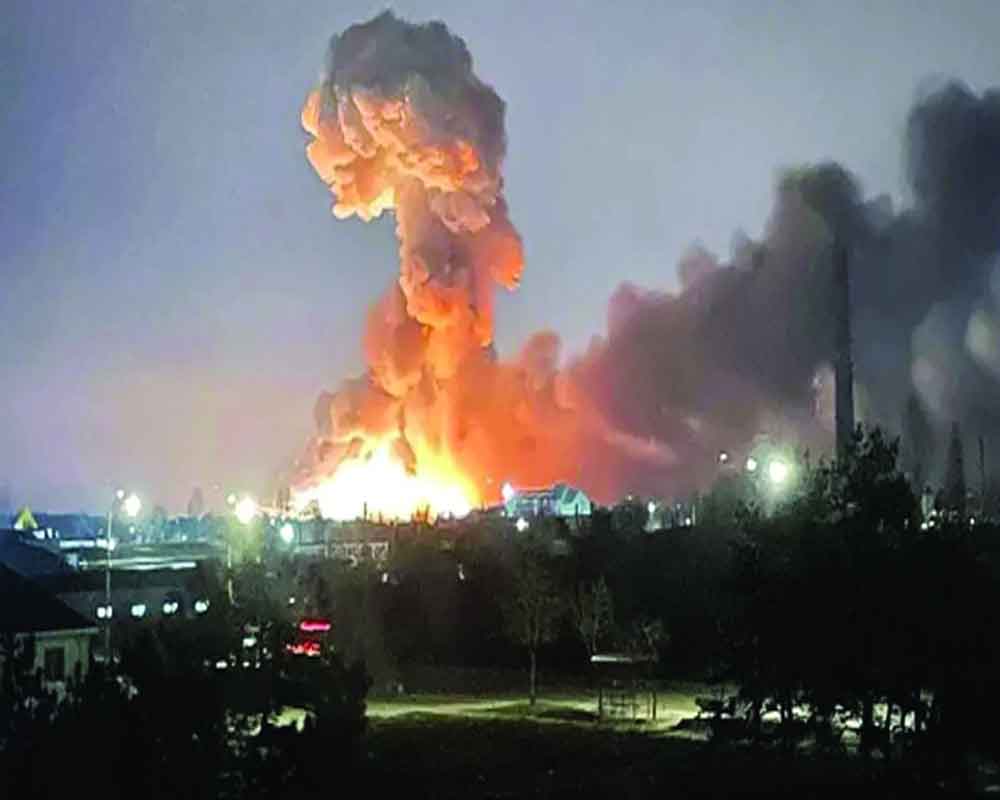The danger is inherent in the continuing conflict in Ukraine
Can the war in Ukraine lead to World War III? It can if talk about an event presages its occurrence. The latest mention has been by Vladimir Putin, who said on March 18, 2024, that a direct conflict between Russia and NATO (North Atlantic Treaty Organisation) would mean that the planet was one step away from World War III. He, however, had added that hardly anyone wanted any such scenario. Other Russian leaders have also mentioned the possibility. Alexander Venediktov, deputy secretary of the Security Council of Russia, had said on October 13, 2022, that Ukraine’s admission into NATO was guaranteed to escalate the conflict in that country into the third world war. Western countries have also been taking the danger of a wider war with Russia seriously. The German newspaper, Bild, reported on January 15, 2024, that the country’s army was gearing up to cope with a Russian attack on the Baltic countries—Latvia, Lithuania and Estonia—in the summer of 2025, that would begin with a spring offensive in Ukraine this year.
Russia’s talk of World War III may well be a part of a strategy to reduce the United States’ and European countries’ support to Ukraine. Germany’s response mentioned above, however, indicates that such talk is being taken seriously. In fact, the German defence minister, Boris Pistorius, has signed an agreement with his Lithuanian counterpart, Arvydas Anusauskas, for stationing 4,800 German troops and 200 civilians in the latter’s country.
With countries preparing for war, speculation about the conflict in Ukraine escalating into World War III is understandable. But then, what is a World War? It can be defined as a large-scale conflict involving a number of countries on both sides, stretching over large tracts of the earth, and affecting even on countries that are not directly involved. As things are, World War III would see the United States-led NATO countries pitted against Russia which may be joined by Belarus, China and North Korea.
While talking about the danger of a third world war breaking out over Ukraine, all important global leaders, including Joe Biden and Vladimir Putin, say that they neither want it nor is it likely to happen. But then the US did not expect the Japanese air attack on Pearl Harbour on December 7, 1941 (US calendar) which severely mauled the its Pacific Fleet. Nor did the European powers expect Germany’s surprise attack on Poland on September 1, 1939, which triggered the beginning of World War II.
In the present instance, people have been hearing of a World War III ever since the end of World War II, when the world came to be divided into two blocs. One comprised countries led by the US and clustered round pacts like the NATO, Central Treaty Organisation (CENTO) and the South-East Asia Treaty Organisation (SEATO), the first two targeting the Union of Soviet Socialist Republics (USSR) and the third one, China. Other bloc comprised countries of East Europe which had come into the USSR’s orbit after the end of World War II, and which were members of the Warsaw Pact led by it. China enjoyed observer status in respect of the pact until it withdrew in 1961.
The Cold War that came to prevail between the two blocs was marked by frigid and unfriendly ties. There was no shooting war. The restraining factor was the large nuclear arsenals which both the US and the USSR — and later China — possessed, and the smaller stockpiles of countries like Britain and France. A war between the two blocs, it was felt, would lead to the use of nuclear weapons. The USSR’s premier, Nikita Sergeyevich Khrushchev, graphically summed up the horrors of the resultant scenario when he said, “The living will envy the dead.”
The two blocs came close to a war on two occasions. On May 1, 1960, a Soviet missile brought down a U-2 spy plane, operated under the aegis of the US Central Intelligence Agency, in Russian territory. Its pilot, Francis Gary Powers, who had parachuted to safety, was taken prisoner. The incident put on hold the thaw in US-USSR relations that had followed a meeting at Camp David, Maryland, between the American President Dwight D. Eisenhower and Prime Minister Khrushchev, in September, 1959. It also scuttled the Paris summit in mid-May among the US, the United Kingdom, France and USSR after Khrushchev walked out of it following Eisenhower’s refusal to apologise for the U-2 mission.
The second occasion was the Cuban missile crisis of October, 1962, triggered by the USSR’s move to install SS-4 and SS-5 missiles in Cuba which could hit targets in the US. The latter, under President John F. Kennedy, imposed naval quarantine (read blockade) on Cuba, which the USSR declared it would defy. The matter ended with Kremlin agreeing to discontinue construction work on missile sites and removing weapons the US considered offensive and the US agreeing to remove the Jupiter Intermediate Range Ballistic Missiles it had placed on Turkey’s border with the USSR.
Would good sense prevail in Ukraine’s case as it did on the above two occasions? That needs to be seen. One thing, however, is certain. Serious moves need to be made to ensure an early negotiated settlement.
(The author is Consulting Editor, The Pioneer. The views expressed are personal)


























